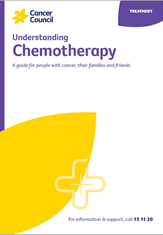- Home
- Cancer of the uterus
- Treatment
- Chemotherapy
Chemotherapy for cancer of the uterus
Chemotherapy uses drugs to kill or slow the growth of cancer cells. The aim is to destroy cancer cells while causing the least possible damage to healthy cells.
Learn more about:
- Chemotherapy for cancer of the uterus
- Side effects of chemotherapy
- Chemoradiation
- Video: What is chemotherapy?
Chemotherapy for cancer of the uterus
Chemotherapy may be used:
- for certain types of cancer of the uterus that are more aggressive
- when cancer comes back after surgery or radiation therapy, to try to control the cancer and to relieve symptoms
- if the cancer does not respond to hormone therapy
- if the cancer has spread beyond the pelvis when first diagnosed
- during radiation therapy (called chemoradiation) or after radiation therapy.
Chemotherapy is usually given by injecting the drugs into a vein (intravenously), often through a drip. You will have a treatment session followed by a rest period. This is called a cycle. You will have up to 6 treatment cycles, with one every 3–4 weeks, so chemotherapy treatment can take several months. Talk to your doctor about how long your treatment will last.
Treatment is usually given to you during day visits to a hospital or clinic as an outpatient or, very rarely, you may need to stay in hospital overnight. Let your oncologist know if you are taking nutritional or herbal supplements as these can interact with chemotherapy and may affect how the drugs work.
Side effects
The side effects of chemotherapy vary greatly and depend on the drugs you receive, how often you have the treatment, and your general fitness and health.
Side effects may include:
- feeling sick (nausea)
- vomiting
- fatigue
- hair loss
- ringing or buzzing in the ears (tinnitus)
- numbness and tingling in the hands and feet (peripheral neuropathy).
Most side effects are temporary and steps can often be taken to prevent or reduce their severity.
For more on this, see Chemotherapy.
Chemoradiation
High-grade endometrial cancer is often treated with EBRT in combination with chemotherapy. This is called chemoradiation and it is done to reduce the chance of the cancer coming back after treatment.
The chemotherapy drugs make the cancer cells more sensitive to radiation therapy.
If you have chemoradiation, you will usually receive chemotherapy in the first and last weeks of your radiation treatment. The chemotherapy will usually be given a few hours before the radiation therapy session.
Once the radiation therapy is over, you may have another 3–4 cycles of chemotherapy on its own.
Side effects of chemoradiation include:
- fatigue
- diarrhoea
- needing to pass urine more often or in a hurry
- cystitis (a type of urinary tract infection)
- dry skin in the treatment area
- numbness and tingling in the hands and feet (peripheral neuropathy)
- ringing or buzzing in the ears (tinnitus)
- low blood counts.
Low numbers of blood cells may cause anaemia, infections or bleeding problems.
Some side effects are temporary, but others can be permanent. Talk to your treatment team about ways to manage any side effects and see more on Managing side effects.
Chemotherapy can affect your immune system, increasing the risk of infection. If you develop a temperature over 38°C, contact your doctor or go immediately to the emergency department at your nearest hospital.
→ READ MORE: Hormone therapy for cancer of the uterus
Video: What is chemotherapy?
Learn more about chemotherapy in this short video.
Podcast: Making Treatment Decisions
Listen to more of our podcast for people affected by cancer
More resources
A/Prof Orla McNally, Consultant Gynaecological Oncologist, Director Oncology/Dysplasia, Royal Women’s Hospital, Honorary Clinical Associate Professor, University of Melbourne, and Director of Gynaecology Tumour Stream, Victorian Comprehensive Cancer Centre, VIC; A/Prof Yoland Antill, Medical Oncologist, Peninsula Health, Parkville Familial Cancer Centre, Cabrini Health and Monash University, VIC; Grace Guerzoni, Consumer; Zeina Hayes, 13 11 20 Consultant, Cancer Council Victoria; Bronwyn Jennings, Gynaecology Oncology Clinical Nurse Consultant, Mater Hospital Brisbane, QLD; A/Prof Christopher Milross, Director of Mission and Radiation Oncologist, Chris O’Brien Lifehouse, NSW; Mariad O’Gorman, Clinical Psychologist, Liverpool Cancer Therapy Centre and Bankstown Cancer Centre, NSW.
View the Cancer Council NSW editorial policy.
View all publications or call 13 11 20 for free printed copies.
Need to talk?
Support services
Coping with cancer?
Speak to a health professional or someone who has been there, or find a support group or forum
Looking for transport, accommodation or home help?
Practical advice and support during and after treatment
Cancer information
Chemotherapy common questions
Addresses chemotherapy concerns such as pain, time and pregnancy
Cancer treatments: a video resource
A short video about surgery, chemotherapy and radiation therapy

